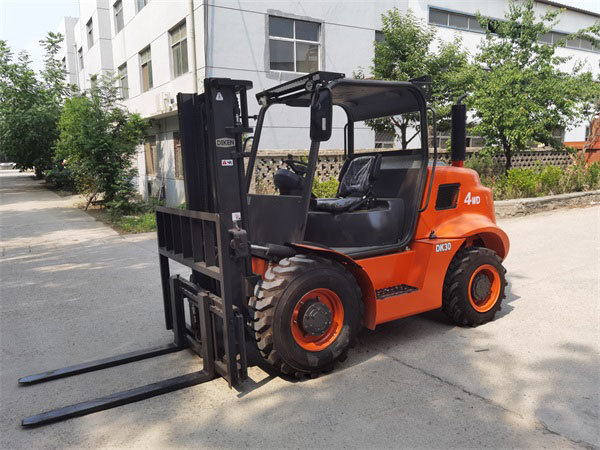Diken news
Top Maintenance Tips for Your 2 Ton Off Road Forklift
Release time: 2025-05-11
Top Maintenance Tips for Your 2 Ton Off Road Forklift
Maintaining a 2-ton off-road forklift is essential for ensuring its peak performance, safety, and longevity. Off-road forklifts operate in challenging environments, which can accelerate wear and tear. Therefore, implementing a proactive maintenance strategy is crucial for every operator and business owner. In this article, we will discuss in detail the best maintenance tips, common issues to watch for, and best practices to keep your forklift running smoothly.
Table of Contents
- Understanding Your Off-Road Forklift
- Why Regular Maintenance is Crucial
- Daily Inspections: What to Check
- Weekly and Monthly Maintenance Tasks
- Engine Care and Lubrication
- Tire and Suspension Maintenance
- Hydraulic System Care
- Troubleshooting Common Issues
- Conclusion
- FAQs
Understanding Your Off-Road Forklift
A 2-ton off-road forklift is designed to navigate rugged terrains, making it an invaluable asset for construction sites, warehouses, and outdoor loading operations. Unlike standard forklifts, these machines feature powerful engines, robust tires, and enhanced suspension systems that allow for increased stability and traction.
Understanding the unique components of your forklift is the first step toward effective maintenance. Familiarize yourself with the engine specifications, hydraulic systems, and electrical components. Additionally, refer to the manufacturer’s manual for specific maintenance schedules and guidelines tailored to your forklift model.
Why Regular Maintenance is Crucial
Regular maintenance of your forklift not only enhances its performance but also significantly reduces the risk of accidents and costly repairs. Here are some critical reasons why prioritizing maintenance is essential:
1. **Safety**: Well-maintained forklifts prevent accidents caused by mechanical failures.
2. **Operational Efficiency**: Routine checks ensure that your forklift operates at optimal efficiency, allowing for increased productivity.
3. **Cost Savings**: Catching issues early can save money in the long run by avoiding expensive repairs and replacements.
4. **Longevity**: Regular maintenance prolongs the lifespan of your forklift, ensuring you get the best return on investment.
Daily Inspections: What to Check
Daily inspections are essential for maintaining the safety and functionality of your 2-ton off-road forklift. Here are the key components to examine each day before use:
Tires and Wheels
- **Check for Damage**: Inspect tires for cuts, punctures, and uneven wear.
- **Air Pressure**: Ensure that the tires are properly inflated to the manufacturer's specifications.
Fluid Levels
- **Oil**: Confirm the engine oil level is adequate.
- **Hydraulic Fluid**: Check the hydraulic fluid reservoir for proper levels.
Braking System
- **Functionality**: Test the brakes before operation to ensure they engage and release smoothly.
Safety Features
- Inspect all safety features, including lights, alarms, and back-up beepers, to ensure they are operational.
Weekly and Monthly Maintenance Tasks
In addition to daily inspections, regular weekly and monthly maintenance tasks should be scheduled to keep your forklift in top condition.
Weekly Maintenance
- **Battery Check**: Inspect battery terminals for corrosion and ensure connections are secure.
- **Cleanliness**: Clean the forklift to prevent dirt and debris from accumulating, particularly in the engine and hydraulic areas.
Monthly Maintenance
- **Fluid Changes**: Depending on usage, consider changing the engine oil and hydraulic fluid monthly or as recommended by the manufacturer.
- **Filter Replacement**: Change air filters and oil filters every month to maintain optimal performance.
Engine Care and Lubrication
The engine is the heart of your forklift, and keeping it in excellent condition is vital.
Cooling System
- **Check Coolant Levels**: Ensure the coolant is at the appropriate level to prevent overheating.
- **Radiator Cleaning**: Regularly clean the radiator to remove dirt and debris that can obstruct airflow.
Lubrication
- **Regular Greasing**: Apply grease to all moving parts as specified in the maintenance manual. This includes joints, linkages, and wheel bearings.
- **Oil Changes**: Change engine oil at recommended intervals to maintain engine health.
Tire and Suspension Maintenance
Proper tire and suspension maintenance can significantly impact the performance and safety of your forklift.
Tire Maintenance
- **Rotation**: Rotate tires regularly to promote even wear.
- **Tread Depth**: Monitor tread depth and replace tires that are worn down.
Suspension System
- **Inspect Shocks**: Regularly check the shock absorbers for leaks and wear.
- **Bushings and Mounts**: Inspect bushings and mounts for cracks or deterioration.
Hydraulic System Care
The hydraulic system is essential for lifting and maneuvering loads. Proper care ensures it functions effectively.
Fluid Levels
- **Regular Checks**: Monitor hydraulic fluid levels and top up as necessary.
- **Leak Inspection**: Inspect hoses and fittings for leaks or wear and replace damaged parts immediately.
Hydraulic Filter Maintenance
- **Regular Replacement**: Change hydraulic filters according to the manufacturer’s recommendations to ensure clean fluid circulation.
Troubleshooting Common Issues
Even with regular maintenance, issues may still arise. Here's how to troubleshoot common problems:
Engine Won't Start
- **Battery Issues**: Check battery connections and charge.
- **Fuel Supply**: Ensure there’s enough fuel and that the fuel lines are clear.
Unusual Noises
- **Inspect Components**: Look for loose or damaged parts in the transmission and drive train.
Hydraulic Failure
- **Fluid Levels**: Check hydraulic fluid levels and inspect for leaks.
- **Pump Inspection**: Ensure the hydraulic pump is functioning properly.
Conclusion
Regular maintenance of your 2-ton off-road forklift is essential for maximizing efficiency, safety, and longevity. By following these maintenance tips and implementing a consistent routine, you can avoid costly repairs, enhance operational efficiency, and ensure safety for all operators. Prioritize daily inspections, establish a weekly and monthly maintenance schedule, and address issues promptly to keep your forklift in top shape. With diligent care, your forklift will continue to be a reliable asset for years to come.
FAQs
1. How often should I change the oil in my forklift?
It is recommended to change the oil every 250 hours of operation or as specified in your manufacturer’s manual.
2. What should I do if my forklift starts making strange noises?
Investigate the source of the noise, check for loose components, and consult a mechanic if needed.
3. How can I extend the lifespan of my forklift?
Implement a regular maintenance schedule, conduct daily inspections, and address issues promptly.
4. What are the signs that my forklift needs maintenance?
Signs include unusual noises, warning lights, decreased lifting capacity, or fluid leaks.
5. Is it necessary to hire a professional for forklift maintenance?
While some tasks can be performed by operators, it is advisable to have a qualified technician conduct thorough inspections and repairs as needed.
Keywords: 2 ton off road forklift










